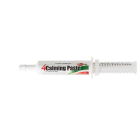
Checking for Parasites
One important aspect of the veterinary visit is the parasite evaluation. In order to do this, your vet may ask you to collect a stool sample from your pet before you visit. This may sound odd or even nasty, but it is necessary for your vet to be able to properly check your pet for parasites such as whipworm, roundworm, giardia, hookworm, and tapeworm. These parasites feed off your pet and can be fatal if left untreated. Using products such as Dimmitrol, Heartgard, and Revolution for your dog and Advocate and Revolution for you cat will help prevent heartworms from ever taking up residency inside your pet. Drontal for Dogs, Drontal for Cats, and Profender for Cats will take care of the intestinal worms.
During the parasite evaluation, your vet will also be able to look out for other health problems. Blood in the stool, for example, can be a sign of internal bleeding, which is a very serious problem. Problems with the digestive system and the pancreas can also be recognized from a stool sample. Therefore, no matter how gross you might think it is, it is very important for you to collect the sample for your vet.

Checking the Urine
In addition to checking your pet’s stool, your vet will want to check your pet’s urine. Once again, you might be asked to collect a sample before your veterinary visit. The urinalysis will allow your vet to make sure your pet isn’t suffering from diabetes, dehydration, kidney disease, or some form of infection. By measuring the amounts of sugar, protein, blood, and white blood cells in your pet’s urine, your vet can determine whether any of these levels are a problem for your pet. Remember, early detection is vital in reversing many health conditions or preventing them from becoming a problem in the first place.

Checking the Blood
Your vet will also want to draw some blood from your pet in order to conduct several tests. One of these is the blood-chemistry panel. This test measures the electrolytes, enzymes, and other elements in your pet’s blood. With this information, your vet can make sure organs such as the liver, kidneys, and pancreas are functioning normally.
Your vet will also perform a complete blood count. With this test, your vet can determine how many white blood cells, red blood cells, and platelets are in your pet’s blood. If these counts are elevated or reduced, it can mean your pet is suffering from a serious disease such as leukemia or anemia. In addition, the blood count makes it possible for your vet to monitor levels of certain medications your pet may be taking.
All of the tests performed at your pet’s veterinary visit are important to its overall health. Be sure to have these check-ups regularly and to follow through on any advice or treatments your vet may suggest.




